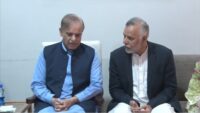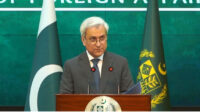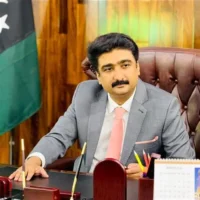June 16, 2021: Russian President Vladimir Putin has imprisoned the charismatic leader of an opposition movement, shuttered the group’s 40-plus offices and branded the entire membership as “extremists.”
Which explains why allies of Alexei Navalny, Putin’s chief antagonist and would-be political rival, are rooting for a “black swan” moment, some as-yet-unforeseen political event, that triggers the Russian dictator’s downfall.
And why, on the eve of a high-stakes summit between Putin and U.S. President Joe Biden, Navalny’s chief of staff is in Washington, huddling with State Department officials and American lawmakers about U.S. strategy to confront Russia over its expanding list of aggressions, from cyberattacks to disinformation.
“We are not pretending Putin will leave in next year or even five years. It may take a long time,” said Leonid Volkov, who helped run the daily operations of the neonatal anti-corruption organization.The day before, Russia banned Navalny’s anti-corruption organizations and barred its allies from running in the upcoming parliamentary elections in September. Navalny has been in prison since January, after escaping a poisoning attempt, which he blames on the Kremlin.
Putin has denied involvement in the assassination attempt, but has refused to guarantee that Navalny will be released from prison. “They will not be treated worse than anyone,” Putin told NBC News in an interview broadcast Monday. Fiona Hill, a Russian expert with the Brookings Institution think tank in Washington, said Putin was “very happy” if Navalny had died in prison during a hunger strike earlier this year. Navalny called off the strike after being warned by his doctors that his life was in danger.
Hill, a former national security adviser in the Trump administration, said Putin was now looking for other ways to minimize Navalny’s influence. She described the June 10 briefing by Brookings as a “huge threat” to Putin and his cronies, who are “a very corrupt and protective group.”
But Volkov says the United States can take meaningful steps to counter Putin’s repression. He says the Russian government’s recent ban on Navalny organizations only serves to highlight Putin’s weakness. “Putin can bulldoze all our regional offices, It is not going to help them. It will not improve Russia’s economy, or it will alleviate the deep frustration of the Russians with the corruption of the Putin government. And it will certainly improve the low rating of their approval among Russia’s young generation,” he said.
An independent poll conducted by the Levada Center on the Russian government in February showed Putin with an overall approval rating of 64%. Among Russians between the ages of 18 and 24, approval was down 17 percent from the previous year to 51 percent. “Putin enjoyed more than 80% of these ratings,” Volkov said. “For him, this is a new and uncomfortable and stressful role.” And those who are under pressure make mistakes.
“Our job is to make up for these mistakes,” he added. He acknowledged that Navalny’s movement was facing a low movement. Volkov said Navalny’s condition was stable. And they are able to communicate, although they do not say how. Volkov himself is living in exile in Lithuania, where he says he takes “rational precautions” to protect himself. He said that now that all his offices were closed, his anti-corruption work had been shifted entirely online.
But he insists his anti-corruption campaign can keep the short office afloat and provide support, even if the shuttered offices are closed and their activities are severely restricted. Volkov acknowledged that the group relies heavily on major tech platforms to reach its Russian supporters. “The strategy is to … win more sympathy, win more voters, win more supporters, create more challenges for the government and create more tension – until the government makes its last mistake,” he said. “That said, we don’t know when it will happen.”
He acknowledged that a revolution similar to the Arab Spring was not yet possible in Russia, and that he would have to wait until Putin’s death. “But we are convinced that Putinism will not survive,” he said, likening Russia to a “mafia state.” By exposing Putin’s corruption, Volkov said, Navalny’s movement could “increase chaos and discontent in Russia” so that any random incident could in fact lead to large-scale protests. “
In one of its most successful projects, the Navalny Anti-Corruption Foundation released a viral video alleging that Putin owns a $1.3 billion palace near the Black Sea. Putin has denied any involvement with the palace. In a recent conversation with US policymakers, Volkov said he had emphasized the benefits of the United States to Putin. He and other Navalny allies have called on the Biden administration to approve a band of 35 wealthy Olgarchis and Kremlin activists close to Putin.
He said he would consider Biden’s summit with Putin a success if the Russian autocrat makes “concrete and measurable concessions on human rights issues,” such as revoking the extremist law that banned Navalny’s group or releasing some political prisoners.
“I think it’s very realistic because of the leverage the United States actually has at this very moment of political history,” he said. If Biden uses that leverage, “this will be perfectly possible.” Volkov said he thinks his message is resonating with officials at the State Department and in Congress.
“We have a feeling that the administration is thinking like what to squeeze out of Putin, which concessions they could actually achieve,” he said.
But several Russia experts said they have low expectations for the summit. Hill said if Biden raises Navalny’s imprisonment, Putin will try to make a false equivalence to the Americans who have been arrested for their role in the Jan. 6 insurrection at the U.S. Capitol. “He wants to push right back at us,” she said. Hill said the political polarization that has gripped the U.S. is “providing Vladimir Putin with lots of fodder for his typical what-about-ism.”
Stay tuned to BaaghiTV for latest news and Updates!






